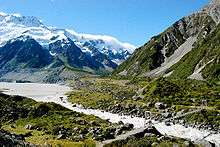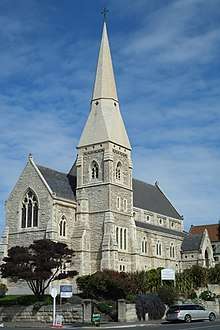Alps to Ocean Cycle Trail
The Alps 2 Ocean Cycle Trail is a cycle trail funded as one of the projects of the New Zealand Cycle Trail. The trail extends more than 300 kilometres (190 mi) from Aoraki / Mount Cook to Oamaru on the Pacific Ocean. Suitable for all ages, the trail is an easy grade, and offers a mix of on and off-road trails.


Sites on the trail include: • Aoraki/Mt Cook • Scenic Helicopter Flights • Snow-capped Mountains • Golden Tussock Landscapes • Glacier Lake Tours • High Country Stations • Hydro Canals • Native Forests • Elephant Rocks • Limestone and Clay Cliffs • Maori Rock Art • Vanished World Fossil Sites • Boutique Shops • Museums • Lakes: Ohau, Pukaki, Benmore, Aviemore • Historic Limestone Tunnels • Hydro Dams: Benmore, Aviemore, Waitaki • Vineyards • Oamaru's Victorian Precinct • Galleries & Gifts • Steampunk HQ, Oamaru • Blue Penguin Colony • Pacific Ocean
Funding for the trail from the NZCT budget was approved in July 2010,[1] after the trail had been shortlisted as one of 13 from 54 nationwide proposals.[2]
The trail has been described by Tourism Waitaki general manager as the greatest tourism opportunity the Waitaki Valley region had ever seen.[3]
Sections
The trail comprises eight sections, and from west to east descends from 780 metres (2,560 ft) down to sea level:
Aoraki/Mt Cook to Braemar Station
The 32 kilometres (20 mi) long first section starts out on a dedicated cycle trail, ideally suitable for mountain bikes, and continues on a quiet gravel road. The first section is the most remote of the trail and includes some unbridged stream crossings. Braemar Station offers only limited accommodation – one option is to include the second section on the first day of riding.
Braemar Station to Twizel
Continuing on a gravel road over hilly terrain, this 43 kilometres (27 mi) section takes in the southern shore of Lake Pukaki and the hydro-electric system of the area around Twizel once on sealed roads. Towards Twizel, the cycle trail leads across Pukaki Flats, an area of tussock grasslands typical for the Mackenzie basin. Twizel is the largest town along the cycle path until the end at Oamaru.
Twizel to Lake Ohau Lodge
The third section is 38 kilometres (24 mi) long and is the only one with a slight gain in elevation. It partly follows canals that are part of the hydro-electric system connecting the glacial lakes. A dedicated cycle trail skirts the southern shore of Lake Ohau, finishing on a sealed road to Ohau Village and Ohau Lodge.
Lake Ohau Lodge to Omarama
The dedicated cycle trail in this section leads through remnants of old beech forest and includes the biggest elevation changes, climbing about 400 metres (1,300 ft) along the Ohau Range to the highest point on the trail at over 900 metres (3,000 ft) above sea level, before descending even more to finish a total of about 100 metres (330 ft) lower after a total length of 40 kilometres (25 mi).
Omarama to Otematata
The first half of this 24 kilometres (15 mi) section over the Omarama Saddle is on a dedicated cycle trail next to SH83, the second half is on the state highway itself.
Otematata to Kurow
Continuing into the Waitaki Valley, the sixth section, 44 kilometres (27 mi) long, follows sealed public roads and takes in Benmore Dam, the largest dam within the Waitaki hydro-electric power scheme, as well as Aviemore Dam and Waitaki Dam.
Kurow to Duntroon
From Kurow, the cycle trail continues 23 kilometres (14 mi) off-road to Duntroon,[4] in an area well known for its limestone formations, Maori rock drawings and dinosaur fossils of the "Vanished World".[5]
Duntroon to Oamaru
The last section partly follows the Vanished World trail and past the Elephant Rocks on a mix of sealed public back roads and dedicated cycle trails. From Weston, the cycle trail follows an old railway line and enters Oamaru via the Oamaru Gardens. It finishes after 55 kilometres (34 mi) at Friendly Bay, adjacent to Oamaru's Victorian Historic Precinct.
References
- "Editorial: Pedalling to a windfall". The Timaru Herald. 7 July 2010. Retrieved 13 July 2010.
- "National Cycleway Success For Mackenzie Region" (Press release). Scoop.co.nz. 12 February 2010. Retrieved 13 July 2010.
- "$7 million for Otago cycleways". Otago Daily Times. 7 July 2010.
- "New A2O section opened", Hamish MacLean, 14 January 2016, ODT
- "Vanished World Trail". University of Otago. Archived from the original on 20 February 2014. Retrieved 8 April 2014.
External links
| Wikimedia Commons has media related to Alps to Ocean Cycle Trail. |
- Official website of the Alps 2 Ocean Cycle Trail.